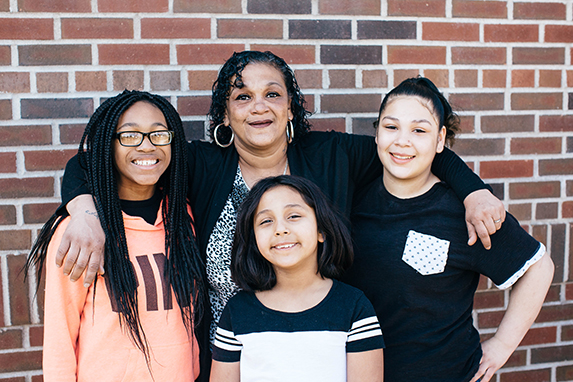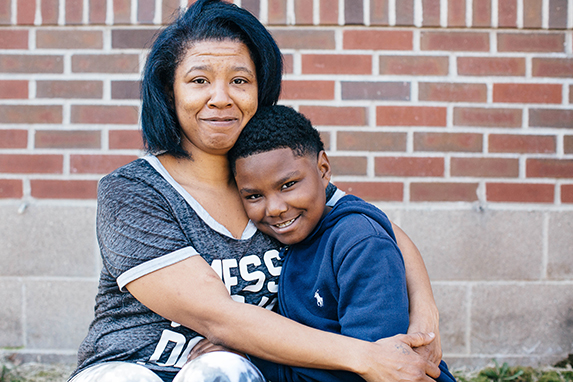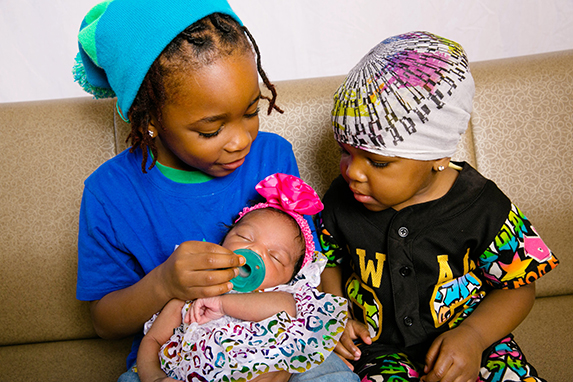In 2017, the Catholic Community Foundation (CCF) focused its social impact grants on organizations serving young mothers facing homelessness.
“This money comes from a generously-funded endowment created by visionary donors,” says Meg Payne Nelson, program officer at CCF. In 1998, knowing CCF had the requisite grantmaking skills, the founding group of donors established the Community Priorities fund. “These donors wanted to come together to serve the unique needs of the poor and vulnerable in our community, and in particular, the elderly, school-aged youth, and young mothers,” says Nelson. The fund is perpetual and it is growing because it continues to accept additional gifts from anyone who believes in responding to God’s call for us to love the most vulnerable in our community.
“We knew from our research that no other physical, financial, or sociological need of young families can be addressed until their housing situation has been stabilized,” says Nelson. “So this year’s goal of serving the needs of mothers with young children focused exclusively on those experiencing homelessness.” A total of $63,000 was distributed among eight organizations, including St. Anne’s Place (now part of Haven Housing) and Theresa Living Center.

Photos provided by Haven Housing
St. Anne’s Place
From a woman’s first moments at St. Anne’s Welcome Center, the environment and the staff aim to soothe and start building trust. The families experience a supportive trauma-informed CARE (Child-Adult Relationship Enhancement) model, which aims to minimize the effects of trauma, strengthen the mother-child bond, promote early childhood development, and encourage parent education and empowerment.
St. Anne’s Place is the first shelter in Minnesota to use the CARE model. “It’s so important,” says Julie Kelley, executive director. “If left untreated, trauma seeps into everything and can last a lifetime.”
The CCF grant allows St. Anne’s to focus specifically on very young mothers and their children. In addition to housing, the families get help setting goals, and creating individual safety and coping plans. Safety plans encourage women to think through potentially dangerous situations and, in advance, determine steps or trusted people that could help.
Coping plans are used when a woman starts to feel angry or upset, providing steps to help her move past conflict. “If they are revving up and feel ready to run or lash out, it helps them realize it’s OK to simply say, ‘I need 5 minutes,'” says Kelley.
St. Anne’s also involves the mothers in the education of their children with Head Start and Early Childhood Family Education. Staff ensures the mothers are completely comfortable with their child’s teacher and classroom before they start school. “We want the moms to have a voice,” says Kelley. “In many cases, their own parents had little to do with their education, so it’s new territory for many of them.”

Photos provided by Haven Housing
Theresa Living Center
A CCF grant also funded Theresa Living Center’s residential program, which provides housing for single women who are pregnant or have a child under the age of 1, and a second program that provides case management services and rental assistance to single-parent families living in their own apartments. Both programs serve individuals and families after they have experienced homelessness.
“A lot of our work is helping our clients plan the next steps in their lives, especially in the areas of finding affordable housing and a living-wage job,” says Lucy Zanders, executive director.
Escalating rents have complicated the work. “The families that come to us don’t make a living wage, so we often end up helping them find other subsidized housing,” says Zanders.
In addition to rental assistance, Theresa Living Center helps the women set goals and create plans that help them move, one step at a time, toward independent living. Some women complete GEDs. Others work on certificate programs or college degrees. And some pursue work in fields with higher wages.
Zanders told of one success story. “We had a mom who enjoyed physical labor and looked into driving a forklift. She got an interview at a factory; they liked her and said they would help her get certified. She got the job and we helped her get housing based on her new salary.”

Photos provided by Haven Housing
From Housing to a Home
“This year’s grants felt especially powerful,” says Nelson. “They allowed the generosity of our donors to help two generations at the same time. And because the eight grantees serve young mothers in crisis or transition with such compassion and care, the result is not simply housing, it’s a home.”
If you are interested in learning more about the Community Priorities fund and how you can contribute, contact CCF Program Officer Meg Payne Nelson at 651.389.0882.
